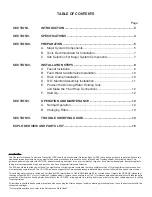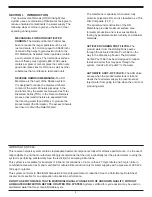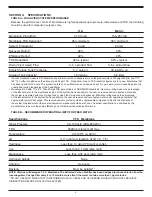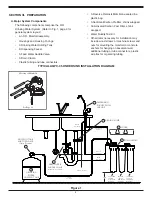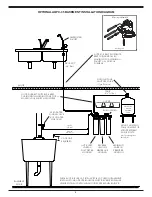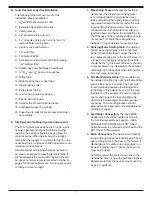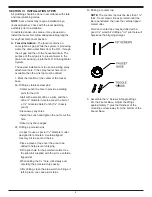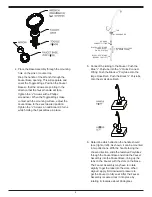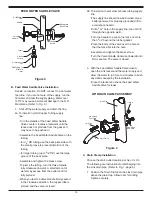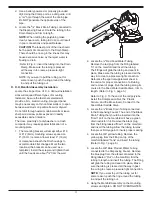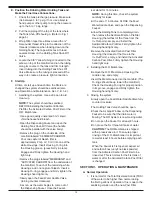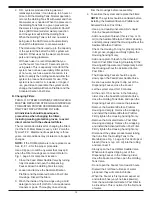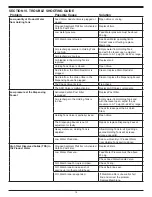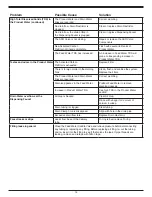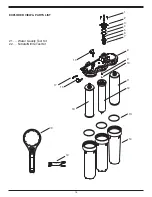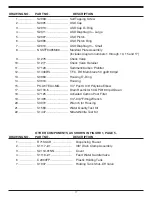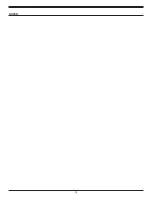
3
SECTION I. INTRODUCTION
Your new Reverse Osmosis (RO) Drinking Water
System uses a combination of filtration technologies to
reduce unwanted contaminants in a water supply. The
following steps combine to give you the best in clear
sparkling drinking water:
MECHANICAL FILTRATION/ACTIVATED
CARBON
–The Sediment/Carbon Prefilter has
been to reduce the larger particles such as silt,
rust and scale. Its 5 micron (equal to 0.0002 inch)
nominal rating helps to give maximum life to the
RO Membrane. Activated carbon particles contain
a vast network of pores. The tremendous surface
area of these pores (typically 800–1200 square
meters per gram of carbon) gives the carbon very
good adsorptive sites for chlorine as well as other
substances that contribute to taste and odors.
REVERSE OSMOSIS MEMBRANE–
The RO
Membrane is the heart of the filtration system.
It is designed to reduce the dissolved mineral
content of the water. Minerals picked up in the
environment by the water are measured as Total
Dissolved Solids (TDS). In the Reverse Osmosis
process, dissolved minerals are separated from
the incoming water (Feed Water) to produce the
product water (the Permeate). The excess minerals
are rinsed to drain (the Reject Water).
The membrane is specially constructed, fully
aromatic polyamide film, and is classified as a Thin
Film Composite (T.F.C.).
The spiral wound construction of the RO
Membrane provides maximum surface area
for water production and is less susceptible to
fouling by particulate matter, turbidity and colloidal
materials.
ACTIVATED CARBON POST FILTER–
The
product water from the Holding Tank passes
through the Activated Carbon Post Filter on the
way to the Dispensing Faucet. The Activated
Carbon Post Filter has been designed to reduce
tastes and odors that may pass through the
system. It adds a final “polish” to the water.
AUTOMATIC SHUT–OFF VALVE–
The ASO Valve
senses when the product water tank is full and
closes the feed water supply to prevent excess
reject water from going to drain when the unit is not
producing water.
IMPORTANT NOTICES:
This reverse osmosis system contains replaceable treatment components critical for effective performance. It is the user's
responsibility to, and the manufacturer strongly recommends that the user, periodically test the product water to verify the
system is performing satisfactorily. See the test kit(s) for sampling instructions.
This system is acceptable for treatment of influent concentrations of no more than 27 mg/L nitrate and 3 mg/L nitrite in
combination measured as N and is certified for nitrate/nitrite reduction only for water supplies with a pressure of 280 kPa
(40 psig) or greater.
This system conforms to NSF/ANSI Standard 58 for pentavalent arsenic reduction. See the Performance Data Sheet
Arsenic Facts section for an explanation of reduction performance.
DO NOT USE WITH WATER THAT IS MICROBIOLOGICALLy UNSAFE OR OF UNkNOWN qUALITy, WITHOUT
ADEqUATE DISINFECTION BEFORE OR AFTER THE SySTEM.
Systems certified for cyst reduction may be used on
disinfected water that may contain filterable cysts.
Summary of Contents for AQPC-35
Page 18: ...18 NOTES...
Page 19: ...19 NOTES...


